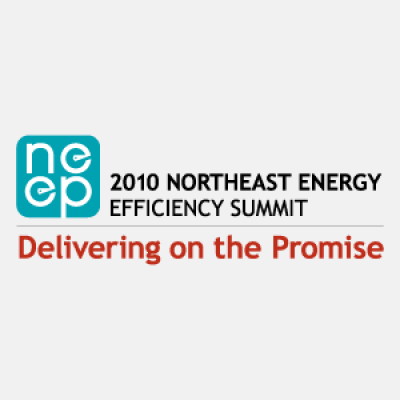
Boston, MA
United States
-
The fifth annual Northeast Energy Efficiency Summit returned to Boston to record rainfall and record attendance. Featuring the theme of Delivering on the Promise, the Summit featured an in-depth conference, two topical workshops, efficiency exhibits and awards presentations honoring regional organizations that have demonstrated their commitment to energy efficiency.
Events started Tuesday with the Northeast Residential Lighting Stakeholders Meeting and the Northeast Workforce Development Workshop, two all-day workshops that allowed attendees to discuss the critical issues affecting the industry and see first-hand examples of programs that work in the region.
On Wednesday, the Summit kicked off with opening remarks from Sue Coakley and Summit Co-Chairs, Phil Guidice (MA DOER) and Tim Stout (National Grid). Kathleen Hogan, Deputy Assistant Secretary of Energy Efficiency: US DOE, outlined what is being done at the federal level to advance energy efficiency and highlighted the unprecedented support for energy efficiency initiatives from the White House as well as unprecedented funding available as a result of ARRA. The morning panel, ‘Delivering on the Promise - Key Strategies', featured Phil Guidice (Moderator), Frank Murray (NYSERDA), Ruth Kiselewich (Baltimore Gas & Electric), Ron Araujo (CT Light & Power), Scott Johnstone (Vermont Energy Investment Corporation) and Tim Stout (National Grid) discussing the challenges they face as program administrators and strategies they're employing to overcome those challenges. Key themes that emerged include the importance of demonstrating the effectiveness of efficiency programs to residential & commercial customers, the need for regional coordination as well as the need to train the next generation of employees.
Echoing Kathleen Hogan's remarks, Gina McCarthy, Assistant Administrator for the Office of Air & Radiation: US EPA, reaffirmed the federal government's commitment to advancing energy efficiency policies as the country moves towards a Clean Energy Future. She also lauded the Northeast for leading the way nationally with its energy efficiency policies and programs, citing the EPA's Region 1 Community Energy Challenge and the Regional Greenhouse Gas Initiative as examples of programs that successfully address the adoption of all cost-effective energy efficiency and the reduction of the region's GHG emissions.
As part of the Business Leaders for Energy Efficiency Program, NEEP honored a record number of organizations from across the region that demonstrate outstanding acts of leadership and best practices of energy efficiency. This year's pool of 13 honorees comprised universities, manufacturers and warehouses, a restaurant and a county representing a cumulative annual savings of more than $4.5 million.
The afternoon's panel, ‘Delivering on the Promise - Engaging Communities & the Public ', looked at the value of engaging community members when introducing energy efficiency initiatives to a region. Harvey Michaels (MIT) moderated a panel of experts including Penni McLean-Conner (NSTAR/NEEP Board President), Julia Dundorf (Clean Air-Cool Planet) and Jim Grevatt (Vermont Energy Investment Corporation). Using examples from Massachusetts, New Hampshire and Vermont the panelists discussed how to best facilitate the process of engaging communities when local utilities want to roll out an energy efficiency strategy. Some challenges discussed include how to best scale up a successful pilot program, how to determine what motivates a community and how to give ownership to a community group while also achieving the savings goals mandated by state policies.
